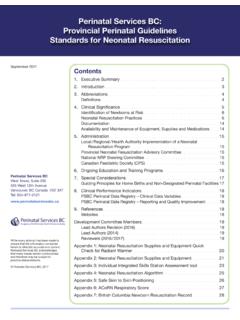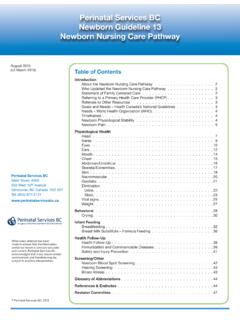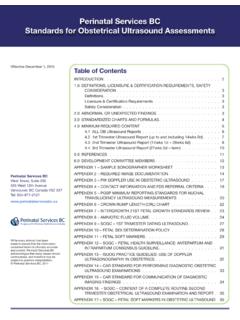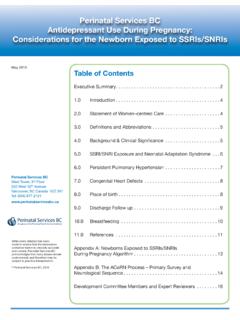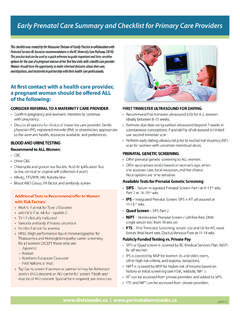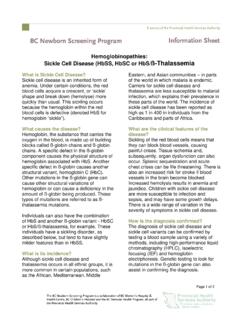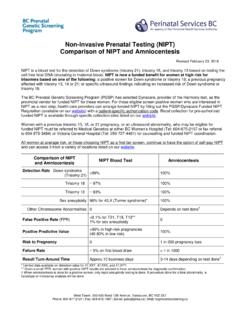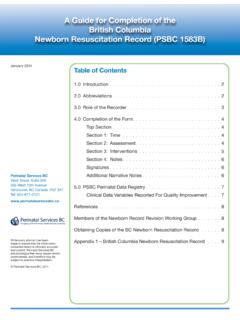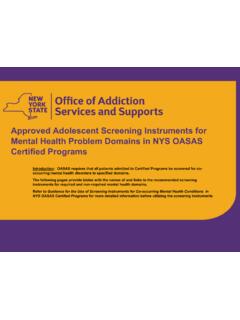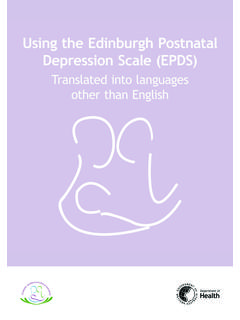Transcription of Mental Health Disorders Guideline - Perinatal Services BC
1 Best Practice Guidelines for Mental Health Disorders in the Perinatal PeriodBC Reproductive Mental Health Program & Perinatal Services BCMarch 2014 BEST PRACTICE GUIDELINES FOR Mental Health Disorders IN THE Perinatal PERIOD (2014) is a manual for healthcare clinicians who care for women during their reproductive years. This guidance describes best practices for the care of women with depression , anxiety Disorders , bipolar disorder and psychotic Disorders , including postpartum psychosis, in the Perinatal period (conception through to one year postpartum).PRODUCED BYBC Reproductive Mental Health Program, part of BC Mental Health and Substance Use Services and Perinatal Services BC. Both are agencies of the Provincial Health Services Authority in BC. In partnership with the BC Ministry of Health , Healthy Development and Women s Health : Population and Public LEAD & MAJOR AUTHOR Janet Williams BSN, MBA. Project Manager (Consultant).BC REPRODUCTIVE Mental Health PROGRAMA uthor and Medical Advisor: Dr Deirdre Ryan MB, FRCPC, Psychiatrist & Medical and Editor: Kate Thomas-Peter BSc, MSc, Project Services BCEditor: Janet Walker RN, MSN, Lead for Education and TABLESA uthor and Consultant: Barbara Cadario BSc(Hon), BScPharm, MSc, Clinical Associate Professor, Faculty of Pharmaceutical Sciences, University of British and Consultant (Anxiolytics medication section): Dorothy Li BScPharm, ACPR, CSPI.
2 BC Drug and Poison Information CONSULTANTG illian Hanley BSc, MA, PhD. Postdoctoral Fellow, University of British GROUPS arah Bell RN, MBA, CHE, Executive Director, Children s and Women s Mental Health Programs, BC Mental Health and Substance Use Geber RN, BN, MPA, Executive Director, Healthy Development and Women s Health , Population and Public Health , Ministry of Health GROUPT ricia Bowering MD, FRCPC, Carter MB., BS, FRCPC, Chaplain MPH, Director Child, Youth and Family, Island Davis-Kahn MA, RCC, Clinical Hallam BSN, RN, Knowledge Coordinator, Promotion and Prevention, Interior Health Kennedy MD, FRCPC, Marquette MD, Obstetrician & Misri MD, FRCPC, Munro BScN, RN, MSN Clinical Nurse Specialist, Public Health . Fraser Health Reebye MB, BS, Infant Shulman MD, FRCPC, Smrek BSN, RN, CIHS, Regional Knowledge Coordinator, Promotion and Prevention, Interior Health H Wong MSW, RSW, Social Yeates BHSc, BA, RM, BYBC Mental Health and Substance Use Services and Perinatal Services BC, both agencies of the Provincial Health Services AND PRODUCTION BYGeorge 2014 BC Reproductive Mental Health COPIES FROMBC Reproductive Mental Health Mental Health and Substance Use Services (Programs and Services ) Perinatal Services BC HARD COPIES FROMC&W Bookstore Reproductive Mental Health Program & Perinatal Services BCExecutive Summary and Recommendations.
3 Introduction .. Mental Health Disorders in the Perinatal Period .. Prevalence .. Clinical Significance .. Impact of Untreated Mental Health Disorders .. Barriers to Seeking Help .. Key Points .. Perinatal depression .. Education and Prevention .. What is Perinatal depression ? .. Signs and Symptoms .. Risk Factors .. Screening and Diagnosis .. Screening .. Diagnosis .. Treatment and Self-Management .. Psychoeducation .. Self-care: The NEST-S Program .. Psychotherapies .. Bright Light Therapy .. Pharmacotherapy (Medications) .. Electroconvulsive Therapy .. Partners and depression .. Key Points and Recommendations .. Anxiety Disorders .. Education and Prevention .. What is an Anxiety Disorder? .. Signs and Symptoms .. Risk Factors .. Prevention .. Screening and Diagnosis .. Treatment and Self-Management .. Summary of Treatments .. Medications for the Treatment of Anxiety Disorders .
4 Key Points and Recommendations .. Bipolar Disorder .. Education and Prevention .. What is Bipolar Disorder? .. Signs and Symptoms .. Risk Factors .. Prevention .. Screening and Diagnosis .. Treatment and Self-Management .. Summary of Treatments .. Medications used for the Treatment of Bipolar Disorder .. Key Points and Recommendations .. 49 Table of Contents5 Mental Health Disorders in the Perinatal Psychotic Disorders and Postpartum Psychosis .. Education and Prevention .. What is a Psychosis; Relationship to Psychotic Disorders ; Postpartum Psychosis.. Signs and Symptoms .. Risk Factors .. Prevention .. Screening and Diagnosis .. Treatment and Self-Management .. Summary of Treatments .. Medications for the Treatment of Psychotic Disorders and Postpartum Psychosis Key Points and Recommendations .. Suicide and Infanticide .. Suicide .. Neonaticide and Infanticide .. Key Points and Recommendations.
5 Coping and Support Networks .. 63 Appendix 1: edinburgh postnatal depression scale (EPDS) .. 65 Appendix 2: Diagnostic Assessment Interview in the Perinatal Period .. 66 Appendix 3: Perinatal Suicide Risk Questions .. 69 Appendix 4: Perinatal Infanticide Risk Questions .. 70 Appendix 5: Psychotropic Medications Used in the Perinatal Period .. 71 Appendix 6: Suggested Actions / Monitoring for Women on Psychotropic Medications in the Perinatal Period .. 87 Appendix 7: Types of Psychotic Disorders .. 90 References .. 91 List of TablesTable 1: Prevalence of depression , Anxiety, Bipolar Disorder & Schizophrenia in Perinatal & Non- Perinatal Populations .. 13 Table 2: Common depression Screening Tools .. 20 Table 3: EPDS Scores: Interpretation and Actions .. 22 Table 4: Common Treatments Used for the Treatment of PND .. 24 Table 5: EPDS Score, Interpretation & Action .. 34 Table 6: Guidelines for the Treatment of depression during the Perinatal Period.
6 35 Table 7: Treatments Commonly used to Treat Anxiety Disorders in the Perinatal Period .. 42 Table 8: Guidelines for the Treatment of Anxiety Disorders during the Perinatal Period .. 44 Table 9: Common Treatments for Bipolar Disorder in the Perinatal Period .. 48 Table 10: Guidelines for the Treatment of Bipolar Disorder .. 50 Table 11: Guidelines for the Prevention/Management of Psychotic Disorders & Postpartum Psychosis .. 57 Table 12: General Responses to Identified Suicide Risk .. 59 Table 13: Components of a Safety Plan .. 60 Table 14: Sample Safety Plan .. 606BC Reproductive Mental Health Program & Perinatal Services BCAs many as one in five women in BC will experience a Mental Health disorder during the Perinatal period (pregnancy up to one year postpartum). Such Disorders affect all aspects of a woman s life, as well as that of her baby and family. The risks of untreated Perinatal depression can include compromised prenatal care, increased risk of obstetrical complications, self-medication or substance use, compromised mother/infant interactions and cognitive, emotional and behavioural impairments in the developing child.
7 The most tragic consequences of untreated Perinatal depression are maternal suicide and Mental illness is serious, with the right strategy and a coordinated approach, it can be detected early and effectively treated. The purpose of this Guideline is to support healthcare clinicians in this early detection and coordinated treatment of pregnant and postpartum women with Mental Health Mental Health Disorders common in the Perinatal period are reviewed in this Guideline :1. Depression2. Anxiety disorders3. Bipolar disorder4. Psychotic Disorders and postpartum psychosisEach of the Disorders is discussed in light of the four pillars of action identified in the 2006 Provincial Perinatal depression Framework: education and prevention; screening and diagnosis; treatment and self-management and coping and support networks. Where sufficient evidence exists, best practice recommendations are is a separate section on Suicide and common to all Perinatal Mental Health disordersThe full discussion of Mental Health Disorders in the Perinatal period, including prevalence and clinical significance, can be found in Section 2 of these Encourage women with a personal or family history of a Mental Health disorder to plan their pregnancy, ideally timed when their mood (and physical condition) is as stable as For women with a chronic Mental Health disorder:a.
8 Share decision-making with the woman and her healthcare providers before and during pregnancy to plan individualized treatment that takes into consideration the severity of her illness, previous response to medication and any supports that might be available to Consider referral to a psychiatrist before or during pregnancy to assist with treatment planning and monitoring of the woman s Mental Health Where a woman decides to stop taking medications before or during pregnancy without consultation, pay particular attention to her Mental status throughout pregnancy and especially in the postpartum period because of the high risk of For women requiring psychotropic medications in the Perinatal period:a. Support informed decision-making by discussing the risks and benefits of medications as well as the risks of not treating symptoms with the woman. Involve partners and other family members whenever possible and where Use the minimum number of psychotropic medications at the lowest effective Encourage women with severe Mental Health Disorders requiring multiple psychotropic medications to deliver in a hospital (versus a home birth).
9 This will facilitate closer monitoring of mother and baby. See Perinatal Services BC Guideline on Antidepressant Use During Pregnancy: Considerations for the Newborn Exposed to SSRIs / Where possible, encourage breastfeeding (psychotropic medications are not usually a contraindication to breastfeeding):a. Maximize the breastfeeding support to women to increase the probability of success. Refer to a lactation consultant and/or public Health Summary and Recommendations7 Mental Health Disorders in the Perinatal Periodb. Where exclusive breastfeeding is not possible ( , medical reasons for the mother/baby or challenges for the mother with breastfeeding, including significant psychological stress), support options that promote optimal nutrition for the baby and support the Health and wellbeing of the mother. This may include supplementation with the mother s expressed breast milk, pasteurized donor milk, formula or fully formula Women with premature babies or babies with significant Health problems are encouraged to discuss their psychotropic medications with the baby s pediatrician if they want to Educate partners and family members about recognizing the symptoms of Mental Health Disorders and ways to support women during pregnancy and after the birth.
10 Support should include ways to maximize the woman s opportunity for adequate DepressionThe full discussion of Perinatal depression , including education and prevention, screening and diagnosis, treatment and self-management, can be found in Section 3 of these PointsThese can be found in full in Section Major depression occurs in up to 16% of women in the Perinatal period and at greatest risk are those with a personal or family history of depression and those who have suffered depression in previous pregnancies. Whilst the literature does not support preventive measures in pregnancy, there are some steps that may be taken to prevent depression occurring or re-occurring in the postpartum period. (See discussion in Section 3).Clinical experience is that early detection of Mental Health challenges and Disorders improves outcomes for both mother and baby. In support, the 2006 Framework for BC Addressing Perinatal depression recommends using the edinburgh postnatal depression scale (EPDS) screening tool where care pathways exist.

